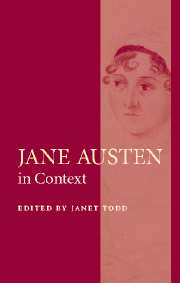24 - Landownership
Published online by Cambridge University Press: 19 December 2020
Summary
Land, as Coleridge and Burke asserted, represented permanence. In law it was termed ‘real’ property, in contrast to personal property and the stocks that were so volatile as seemingly to possess only imaginary value. To own land was to be identified more physically with the nation than to engage in commerce and a wide yet intimate knowledge of the affairs of the countryside where the majority of the nation lived made landowners the ‘natural’ governing class. Families like Austen's Tilneys and Brandons provided the officer ranks of the army, maintaining the honour of their class and country. They represented the law as justices and magistrates, and they regulated community affairs such as poor relief. Owning advowsons, the right to appoint clergymen to their own parishes, they cemented the bond between church and state, the spirit of religion and the spirit of a gentleman. Burke's championship of the proud traditions of the aristocracy against democratic ideas spawned by the French Revolution echoed arguments used throughout the eighteenth century to justify their predominance, a political predominance buttressed by the property qualification for a Member of Parliament enacted in 1710 and a property-based franchise virtually unaltered throughout the century. If some saw ownership of a country house and estate in the seventeenth century as a mere status symbol, a view echoed by Oscar Wilde's Lady Bracknell at the end of the nineteenth, it was much more than this in the intervening period. ‘Rotten’ or ‘pocket’ boroughs and local influence (or bribery and intimidation) in elections brought Parliamentary power and ministerial patronage, and over the period owners tended to dispose of outlying estates to concentrate their property and influence in their principal seats. The popularity of mortgages as investments allowed landowners to unlock the capital value of their property and further enhance it by agricultural improvements and entrepreneurial activities. Estates like Mansfield Park became the foundation of family prosperity and the base for national and imperial ambitions. This survey will outline landowners’ methods of maintaining their position, especially in safeguarding the hereditary transmission of estates, their implication with commercial interests that were apparent adversaries and the criticisms of their activities voiced in Austen's time.
- Type
- Chapter
- Information
- Jane Austen in Context , pp. 269 - 277Publisher: Cambridge University PressPrint publication year: 2005



